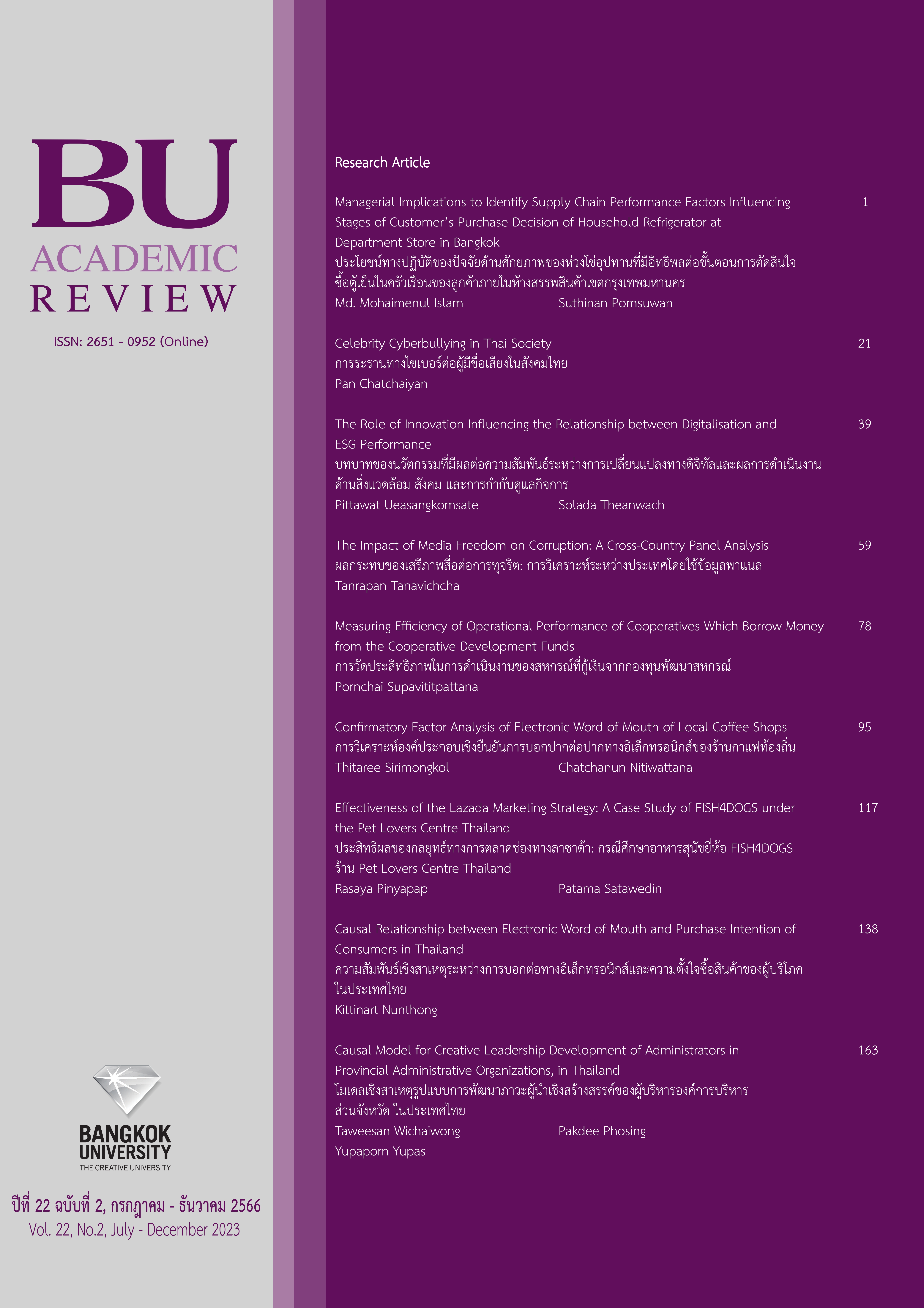บทบาทของนวัตกรรมที่มีผลต่อความสัมพันธ์ระหว่าง การเปลี่ยนแปลงทางดิจิทัลและผลการดำเนินงานด้านสิ่งแวดล้อม สังคมและการกำกับดูแลกิจการ
Main Article Content
บทคัดย่อ
งานวิจัยนี้มีจุดประสงค์เพื่อศึกษา ความสัมพันธ์ระหว่างการเปลี่ยนแปลงทางดิจิทัลของกิจการและผลการดำเนินงานด้านสิ่งแวดล้อม สังคม และการกำกับดูแลกิจการ รวมถึงศึกษาบทบาทของนวัตกรรมที่มีผลต่อความสัมพันธ์ระหว่างการเปลี่ยนแปลงทางดิจิทัลของกิจการและผลการดำเนินงานด้านสิ่งแวดล้อม สังคม และการกำกับดูแลกิจการขององค์กรภาคเอกชน โดยกลุ่มตัวอย่างที่ใช้ในการศึกษาครั้งนี้ คือ พนักงานภาคเอกชนในพื้นที่กรุงเทพมหานคร จำนวน 365 คน ผู้วิจัยได้ทำการสุ่มตัวอย่างตามสะดวก สำหรับเครื่องมือที่ใช้ในการเก็บข้อมูล คือ แบบสอบถามผ่านระบบออนไลน์ และสถิติที่ใช้ในการวิเคราะห์ข้อมูล ได้แก่ ค่าร้อยละ ค่าเฉลี่ย ส่วนเบี่ยงเบนมาตรฐาน สถิติการถดถอยเชิงพหุคูณ และวิธี Hayes Process Macro ซึ่งผลของการวิจัยพบว่า การเปลี่ยนแปลงทางดิจิทัลมีอิทธิพลเชิงบวกต่อผลการดำเนินงานด้านสิ่งแวดล้อม สังคมและการกำกับดูแลกิจการอย่างมีนัยสำคัญ นอกจากนี้นวัตกรรมยังมีบทบาทสำคัญในการเป็นตัวแปรกำกับในความสัมพันธ์ระหว่างการเปลี่ยนแปลงทางดิจิทัลและผลการดำเนินงานด้านสิ่งแวดล้อม สังคม และการกำกับดูแลกิจการ ผลลัพธ์ที่ได้ช่วยให้กิจการทราบว่า กิจการควรมีการบริหารจัดการนวัตกรรมอย่างเหมาะสม เพื่อทำให้ความสัมพันธ์ระหว่างการเปลี่ยนแปลงทางดิจิทัลของกิจการและผลการดำเนินงานด้านสิ่งแวดล้อม สังคม และการกำกับดูแลกิจการมีมากยิ่งขึ้น อย่างไรก็ตามงานวิจัยนี้ได้ศึกษาเฉพาะกลุ่มตัวอย่างที่เป็นพนักงานภาคเอกชนในพื้นที่กรุงเทพมหานคร ซึ่งนับว่าเป็นข้อจำกัดของงานวิจัย ดังนั้นในงานวิจัยครั้งต่อไปควรเพิ่มกลุ่มตัวอย่างให้ครอบคลุมมากขึ้น เพื่อให้สามารถนำผลวิจัยที่ได้ไปใช้เป็นแนวทางในการพัฒนาผลการดำเนินงานด้านสิ่งแวดล้อม สังคม และการกำกับดูแลกิจการในวงกว้างได้มากยิ่งขึ้น
Article Details

อนุญาตภายใต้เงื่อนไข Creative Commons Attribution-NonCommercial-NoDerivatives 4.0 International License.
บทความที่นำมาสมัครลงตีพิมพ์ในวารสารต้องไม่เคยได้รับการตีพิมพ์เผยแพร่มาก่อน และไม่ส่งต้นฉบับบทความซ้ำซ้อนกับวารสารอื่น รวมทั้งผู้เขียนบทความต้องไม่ละเมิดหรือคัดลอกผลงานของผู้อื่น
เอกสารอ้างอิง
Abbasi, E., Amin, I., & Siddiqui, S. (2022). Towards developing Innovation Management Framework
(IMF) for ICT organizations at Pakistan. Journal of Innovation and Entrepreneurship, 11(45),
-23.
Adams, R., Bessant, J., & Phelps, R. (2006). Innovation management measurement: A review.
International Journal of Management Reviews, 8(1), 21–47.
Benchmark Gensuite. (2021). ESG program liftoff: How to start strong, build momentum, and sustain
your gains. Retrieved December 3, 2022, from https://www.benchmarkdigitalesg.com/
Bouwman, H., Nikou, S., Molina-Castillo, F. J., & de Reuver, M. (2018). The impact of digitalization
on business models. Digital Policy, Regulation and Governance, 20(2), 105-124.
Broadstock, D. C., Chan, K., Cheng, L. T. W., & Wang, X. (2021). The role of ESG performance during
times of financial crisis: Evidence from COVID-19 in China. Finance Research Letters, 38,
-11.
Davenport, P. (2014). The attention economy: Understanding the new currency of business.
Boston: Harvard Business School Press.
Fosso-Wamba, S., Akter, S., Edwards, A., Chopin, G., & Gnanzou, D. (2015). How ‘big data’ can make
big impact: Findings from a systematic review and a longitudinal case study. International
Journal of Production Economics, 165, 234–246.
Galbreath, J. (2013). ESG in focus: The Australian evidence. Journal of Business Ethics, 118,
–541.
Kääriäinen, J., Pussinen, P., Saari, L., Kuusisto, O., Saarela, M., & Hänninen, K. (2020). Applying the
positioning phase of the digital transformation model in practice for SMEs: Toward
systematic development of digitalization. International Journal of Information Systems
and Project Management, 8(4), 24–43.
Krejcie, R. V., & Morgan, D. W. (1970). Determining sample size for research activities. Educational
and Psychological Measurement, 30, 607-610.
Kumar, R. R., Stauvermann, P. J., & Samitas, A. (2016). The effects of ICT on output per worker: A
study of the Chinese economy. Telecommunications Policy, 40, 102–115.
Li, Z., Feng, L., Pan, Z., & Sohail, H. M. (2022). ESG performance and stock prices: Evidence from the
COVID-19 outbreak in China. Humanities and Social Sciences Communications, 9(242), 1-10.
Malaviya, P., & Wadhwa, S. (2005). Innovation management in organizational context: An empirical
study. Global Journal of Flexible Systems Management, 6(2), 1-14.
Malisuwan, S., & Kaewphanukrangsi, W. (2018). Kān plīan phān thā ngō̜di čhi than khō̜ng prathēt
Thai phư̄a nam pai sū Thailand 4.0 [Digital transformation for Thailand 4.0]. NBTC Journal, 2(2),
-42.
Mendi, P., & Costamagna, R. (2017). Managing innovation under competitive pressure from informal
producers. Technological Forecasting & Social Change, 114, 192–202.
National Innovation Agency. (2004). Kānčhatkān nawattakam samrap phūbō̜rihān [Innovation
management for executives]. Bangkok: National Innovation Agency.
Navas, D., & Breeze, B. (1999). Scientific-Atlanta integrates its global supply chain and ensures
accurate shipments. I.D. Systems, 19, 34–39.
Nunnally, J. C. (1978). Psychometric theory (2nd ed.). New York: McGraw-Hill.
Parviainen, P., Tihinen, M., Kääriäinen, J., & Teppola, S. (2017). Tackling the digitalization challenge:
How to benefit from digitalization in practice. International Journal of Information
Systems and Project Management, 5(1), 63-77.
Phetsisuk, P. (2022). ESG nǣokhit khwāmyangyư̄n thī ʻongkō̜n khūan chai pen khrư̄angmư̄ rư̄ khǣ
thē ron tām krasǣ [ESG is sustainable concept that organizations should use as the tools
or just a trend]. Retrieved February 4, 2023, from https://www.nia.or.th/ESG-sustainability-concepts- or-trends.
Piepponen, A., Ritala, P., Keränen, J., & Maijanen, P. (2022). Digital transformation of the value
proposition: A single case study in the media industry. Journal of Business Research, 150, 311-325.
Piyautsadarut, S. (2020). Kānsưksā thưng khwāmsamphan rawāng ESG Performance kap
prasitthiphāp thāng kānngœ̄n nai klum bō̜risat ʻutsāhakam thī ʻō̜nwai (Sensitive Industries)
kō̜ranī sưksā nai klum samāchik sahaphāp Yurōp [ESG performance and corporate
financial performance in sensitive industries – An empirical study of European union] (Master’s
thesis, Mahidol University).
Portillo, F., A., González, A. M., Escobedo, S. M., & Pérez, C. J. (2022). The role of innovation in
the relationship between digitalisation and economic and financial performance. A
company-level research. European Research on Management and Business Economics,
(3), 1-10.
Reis, J., Amorim, M., Melão, N., Cohen, Y., & Rodrigues, M. (2020). Digitalization: A literature review
and research agenda. In Proceedings on 25th International Joint Conference on Industrial
Engineering and Operations Management (pp. 443–456). Cham: Springer International.
Rogers, E. M. (2003). Diffusion of innovations (5th ed.). New York: Free Press.
Sharma, M., Raut, R. D., Sehrawat, R., & Ishizaka, A. (2023). Digitalisation of manufacturing
operations: The influential role of organisational, social, environmental, and technological
impediments. Expert Systems with Applications, 211, 1-14.
Simmert, B., Ebel, P. A., Peters, C., Bittner, E. A. C., & Leimeister, J. M. (2019). Conquering the
challenge of continuous business model improvement. Business & Information Systems
Engineering, 61, 451–468.
The National Statistical Office. (2022). Samrūat phāwa kānthamngān khō̜ng prachākō̜n Phō̜.Sō̜.
sō̜ngphanhārō̜ihoksiphā [Labor force survey 2022]. Retrieved December 18, 2022, from
https://www.nso.go.th/sites/2014/Pages/
The Stock Exchange of Thailand. (2019). ESG health check bǣp pramœ̄n bư̄angton nai
kāndamnœ̄n thurakit phư̄a khwāmyangyư̄n [ESG health check, a preliminary assessment
form for sustainable business operations]. Retrieved December 10, 2022, from
https://www.surveymonkey.com/r/ESGHealthCheck.
The Stock Exchange of Thailand. (2022). Rāi chư̄ hu nayang yư̄n THSI (Thailand Sustainability
Investment) [List of sustainable stocks THSI (Thailand Sustainability Investment)]. Retrieved
March 26, 2023, from https://www.setsustainability.com/libraries/710/item/thailand-sustainability-investment-lists.
Tidd, J. (2001). Innovation management in context: Environment organization, and performance.
International Journal of Management Review, 3, 169–183.
Ueachiraphongphan, S., Watthanasin, P., Chanchay, A., & Khuprat, P. (2010). Nawattakam:
Khwāmmāi praphēt læ khwāmsamkhan tō̜ kān pen phūprakō̜pkān [The terms and
classifications on innovation which play vital role in the innovation capability of the
entrepreneurs]. Journal of Business Administration, 33(128), 49-65.
Vu, K., Hanafizadeh, P., & Bohlin, E. (2020). ICT as a driver of economic growth: A survey of the
literature and directions for future research. Telecommunications Policy, 44, 1-20.
World Economic Forum. (2021). The global risks report 2021 (16th Ed.). Geneva: World Economic
Forum.


